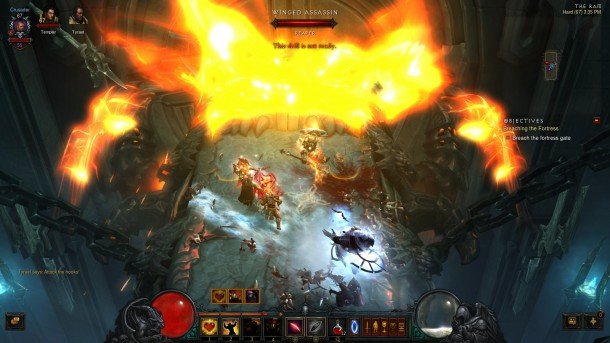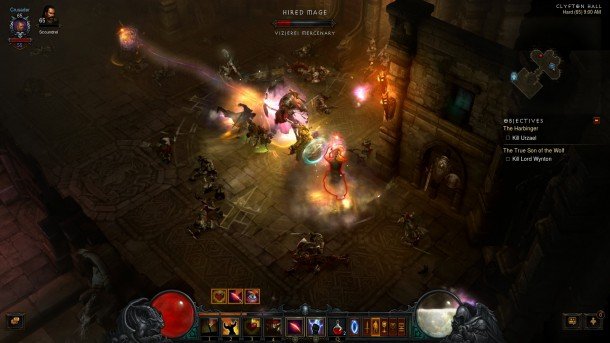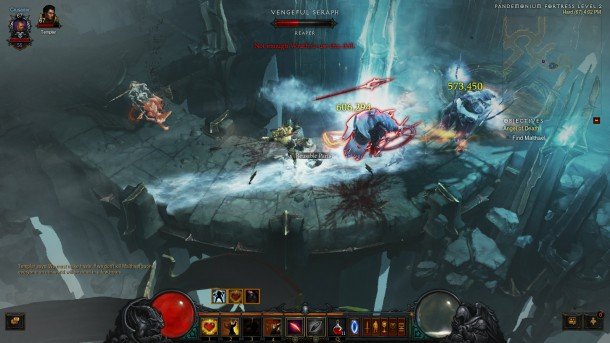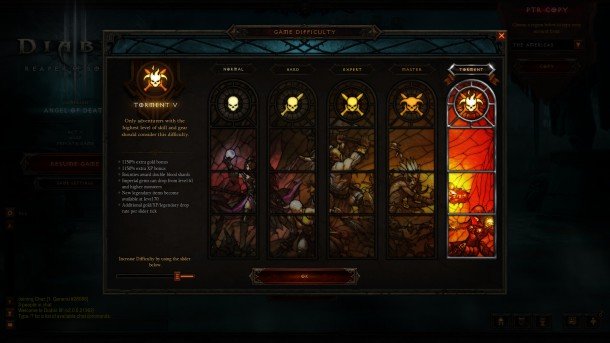Diablo 3: Reaper of Souls review in progress

You won't find our score just yet—this review-in-progress is based on a build of Reaper of Souls which omitted the final boss fight, and server performance may change after launch. For those reasons, we've decided to hold off on assigning a final verdict until after we've played the released game.
I can't recall a gaming villain who looks as imposing as Reaper of Souls' Malthael but leaves so weak an impression. He pops in and out as the narrative unfolds, spouting a few threatening lines before evaporating in a mist of gloom, and thus he recalls Blizzard's similar treatment of Arthas Menethil during World of Warcraft's Wrath of the Lich King expansion. But at least Arthas had the benefit of years of accumulated lore to support his cameos. The star of but one act, Malthael is never around long enough to make us care about his grumbles.
Malthael's saga delivers few surprises; there's little like the shifting allegiances and unexpected deaths of Diablo III proper. If it warrants attention at all, it's only in that it lets us settle a score gone unpunished from the first outing (and in the weakest of the expansion's three boss fights, no less). Instead, it's the environment that stands out in Reaper of Souls. As if in defiance of criticisms that Diablo III was too soft, Blizzard kicks off its tale with medieval streets paved with bodies that squish under your feet. Later, marshlands simmer with more menace than I ever felt in the Leoric Highlands or Dalghur Oasis, and the portal-ridden citadel of Pandemonium mirrors Malthael's madness. Reaper of Souls fails to serve a sufficiently epic story, but it nails the ambiance.

The cast is as entertaining as Reaper's setting, too, with demon dogs that wriggle you in their jaws like a squeaky toy and a boss that wields a demonic flamethrower while a burning ceiling collapses around him. Perhaps that's why Blizzard's kept the prattling to a minimum: story never gets in the way of Reaper's eternal hunt for the next best loot upgrade or its satisfyingly responsive dance of combat and movement. Instead of force-feeding us tragedies, Blizzard instead invests in spectacle. At times I felt as though I should reach for popcorn. Am I really battling on top of a moving battering ram? Thank heavens, I was.
Play it again, Sam(ael)
I'm especially pleased by the direction Blizzard took Reaper's levels because there were sections of Diablo III that I dreaded slogging through—zones like High Heavens with their bland grandeur—but each of Reaper's eleven zones here yields its own treats. What's more, some levels shift randomly with each new playthrough so you're never running through the same map twice. Randomized events pop up around most grimy corners. Some of these rely on familiar scenarios like fending off hordes on a timer, but others present vignettes that demand attention. One time I stepped through an unassuming door and found a would-be usurper gloating over the slain leader of Westmarch. And when my haughty Crusader condemned him for taking advantage of the chaos to further his own ambition, I felt his zeal.

He was a tough bastard, but only because I allowed it. The massive patch that dropped two weeks before launch granted all players the ability to choose specific difficulty modes at their leisure [updated to clarify the distinction between the patch and RoS] , and this mattered a great deal for my well-geared level 60 character with a 55 Paragon rating. Back in 2012, you could only reach the tough stuff by chugging through three separate difficulty modes corresponding to fixed level brackets across three playthroughs. The “hardest,” Inferno, was sometimes stupidly easy thanks to its fixed nature and the conveniences of gear optimization from the auction house. About a month ago I jumped into a multiplayer battle on Inferno mode with Azmodan, the boss of Diablo III's third act, and saw him three-shotted by a high-level, well-geared Paragon.
Reaper of Souls may give folks like him a hard time. Without the tiresome need to slog through an overly easy first playthrough to access tougher stuff; I could choose from one of five difficulty settings right from the beginning and change them if it got too rough. But wait, it gets better. Select the highest level difficulty, "Torment," and you'll find a slider that lets you bump it up six additional tiers of brutality. That gives you perks like 300 percent extra gold or 300 percent extra XP, but if you're unprepared like I was, it'll knock you silly. Weeks or months from now, when I'm decked out in the godliest of gear, I'll be grateful for the remaining challenges and associated replay value.
The biggest gaming news, reviews and hardware deals
Keep up to date with the most important stories and the best deals, as picked by the PC Gamer team.

And so it came to pass that I chickened out and cut down the difficulty a notch or four. It wasn't for naught; when this would-be ruler fell, he dropped a legendary shield that might have given me a fighting chance against his tougher self. Five legendaries in all dropped during my six-hour march from 60 to 70, a marked improvement over the zero found during my initial 2012 playthrough. You're likely familiar with this overhaul. Shortly before launch, Blizzard ditched the auction house and tweaked the game to drop legendaries that live up to their name, eradicate most trash drops, and focus on gear that is usually relevant for your character. That's all true here, too. It works so well that I ran into a laughable problem: so many Crusader-only shields were dropping that I had nothing to give the NPC Templar companion I took along for an extra hand in solo play.

